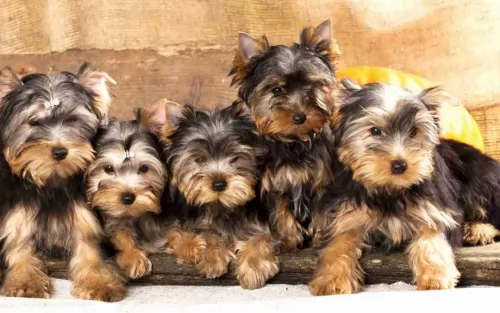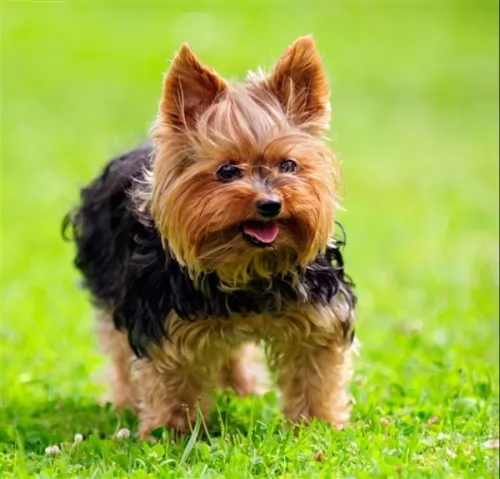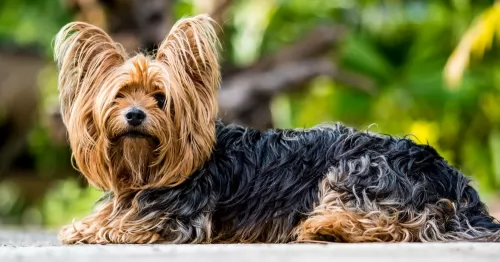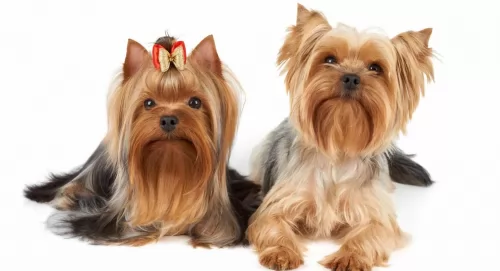 Petzlover
Petzlover Both Yorkshire Terrier and Tamaskan are originated from United Kingdom. Yorkshire Terrier may grow 48 cm / 18 inches shorter than Tamaskan. Yorkshire Terrier may weigh 42 kg / 92 pounds lesser than Tamaskan. Both Yorkshire Terrier and Tamaskan has same life span. Yorkshire Terrier may have less litter size than Tamaskan. Yorkshire Terrier requires High Maintenance. But Tamaskan requires Low Maintenance
Both Yorkshire Terrier and Tamaskan are originated from United Kingdom. Yorkshire Terrier may grow 48 cm / 18 inches shorter than Tamaskan. Yorkshire Terrier may weigh 42 kg / 92 pounds lesser than Tamaskan. Both Yorkshire Terrier and Tamaskan has same life span. Yorkshire Terrier may have less litter size than Tamaskan. Yorkshire Terrier requires High Maintenance. But Tamaskan requires Low Maintenance
 The Yorkshire terrier originated in Yorkshire which is a place in northern England. In mid 19th century workers from Scotland came to Yorkshire in search for work. They brought different varieties of small terriers with them. Earlier they are known as Broken Haired Scotch Terrier and then Toy Terrier. In 1874 they were officially named as Yorkshire Terrier. They begun their journey as hunting dogs and later developed as companion dogs. AKC registered the breed in 1878.
The Yorkshire terrier originated in Yorkshire which is a place in northern England. In mid 19th century workers from Scotland came to Yorkshire in search for work. They brought different varieties of small terriers with them. Earlier they are known as Broken Haired Scotch Terrier and then Toy Terrier. In 1874 they were officially named as Yorkshire Terrier. They begun their journey as hunting dogs and later developed as companion dogs. AKC registered the breed in 1878.
 It is believed that the Tamaskan has been specifically bred to resemble a wolf, and he does too.
It is believed that the Tamaskan has been specifically bred to resemble a wolf, and he does too.
They aren’t recognized by the Federation Cynologique Internationale as they aren’t purebred. In fact they aren’t recognized by any kennel club, being crossbred with other dog breeds such as the German Shepherd, Siberian Husky and Alaskan Malamute.
 Yorkshire terriers are one of the glamorous member of the dog breeds. They have excellent personality as their owner will be surely proud of them when taking them in public. They like to go outside and make adventures. They are good companion dogs and watch dogs too. They are very affectionate with their owners. Yorkies always bark when any stranger comes and they should be taught about neighbours and when to bark. They will get angry on seeing new dogs and surely chases squirrels.
Yorkshire terriers are one of the glamorous member of the dog breeds. They have excellent personality as their owner will be surely proud of them when taking them in public. They like to go outside and make adventures. They are good companion dogs and watch dogs too. They are very affectionate with their owners. Yorkies always bark when any stranger comes and they should be taught about neighbours and when to bark. They will get angry on seeing new dogs and surely chases squirrels.
They like to spend more time with their people. Leaving them alone for long time is not good. Yorkshire terrier should be treated gently and with love. They love to spend time with older children. They love apartment life if they are made to play and walk daily. Yorkies are the second most popular dog in America.
 The beautiful Tamaskan dog is large, standing at between 61 and 71cm in height and weighing between 23 and 45 kg.
The beautiful Tamaskan dog is large, standing at between 61 and 71cm in height and weighing between 23 and 45 kg.
It is a mix between several sled dogs – Siberian Husky and Alaskan Malamute. The thick double coat is coarse and can be grey, cream, black or reddish and the tail of the Tamaskan is wolf-like too – thick and bushy.
His ears are erect and alert and he has sharp hearing. His almond shaped eyes can be yellow or brown and they are alert and bright and don’t miss a thing.
The Tamaskan is capable of becoming a good family pet, being gentle with children and accepting of other dogs. His high intelligence makes it that he can learn a lot of simple commands.
Because he has been a pack dog, he doesn’t like to be left alone. He is social and as a pet he will want to be an interactive part of his human family. Leaving him unsupervised for days on end will see him getting up to mischief.
He will die of depression, boredom and loneliness if he is put into the back yard and ignored.
They are certainly not recommended for life in the city but will need to have a large space to run and play.
 Yorkshire terrier are not so much friendly with children. It is not advised to leave them with children without adult supervision.
Yorkshire terrier are not so much friendly with children. It is not advised to leave them with children without adult supervision.
They were previously used to catch rats and hunt badger and fox. They are excellent watchdogs and defend their territory very well.
They adapts well for apartment living. But they will not be happy if leaved alone for a long time. Yorkies cannot tolerate too hot or cold weather.
They are moderately easy to train. Yorkshire terrier should be trained early when they are amenable to process. Sessions should be conducted with lots of treats and must be short as they will easily get bored.
 The Tamaskan may look like a wolf but he isn’t aggressive. He’s looks can be to your advantage because intruders think twice before confronting a ‘wolf’.
The Tamaskan may look like a wolf but he isn’t aggressive. He’s looks can be to your advantage because intruders think twice before confronting a ‘wolf’.
Little do they know that this is a loving, loyal dog that makes an excellent playmate for children. They’re social too and want to be with their family a lot of the time.
They’re dogs so devoted to their human family that they can even suffer with separation anxiety.
Give him the love and exercise he craves and you’ll find in him the most awesome canine friend.
 Your healthy Tamaskan, even though he isn’t prone to common genetic health problems, can get any one of the many dog illnesses there are, although this is highly unlikely.
Your healthy Tamaskan, even though he isn’t prone to common genetic health problems, can get any one of the many dog illnesses there are, although this is highly unlikely.
However without good food, exercise, love and care, he can also be susceptible to parasites, rabies, parvovirus, hip dysplasia, bloat, skin infections and cancer.
 For English bull dog puppies, When you change the puppy food from liquid to solid initially you must give what the dam is having. This is to avoid digestive problems when new food is introduced. The level of liquid food should be reduced in a step by step manner and thus increasing solid food gradually.
For English bull dog puppies, When you change the puppy food from liquid to solid initially you must give what the dam is having. This is to avoid digestive problems when new food is introduced. The level of liquid food should be reduced in a step by step manner and thus increasing solid food gradually.
You have two choices and one is manufactured dog food and another is home cooked food. Commercial brands are not suggested as they contain artificial coloring and chemical preservatives.
Vaccinations should be made at the right time. The food given should be the best.
Yorkshire terrier should be taught tricks by giving rewards. Exercising them has benefits such as maintaining muscles, release pent-up energy, good for heart, good metabolism, good sleep and be active.
 The Tamaskan Dog is very active. He just loves activity - long walks and hikes and lots of running off a leash. He’ll love ball games too – anything that keeps him mentally and physically active.
The Tamaskan Dog is very active. He just loves activity - long walks and hikes and lots of running off a leash. He’ll love ball games too – anything that keeps him mentally and physically active.
Provide your beautiful, active Tamaskan dog with top quality food that is rich in protein. You can give him one of the quality commercially manufactured foods – just check out the ingredients on the packaging and go for the dog foods with wholesome, natural ingredients in them.
Your Tamaskan is part of the family and deserves some home-made food. Nothing spicey and exotic as you’ll sit with stomach problems. Boiled chicken, brown rice or pasta and spinach, sweet potatoes and carrots are a super healthy choice and food like this won’t play havoc with your dog’s digestion.
This food can all be chopped up and small portions added into the dry kibble twice a week.
●This is a fairly low maintenance dog. He does shed so a good brush twice a week will be sufficient for him.
●When you brush him, check him over for unusual lumps. Look inside his eyes and inside his mouth as he can’t tell you about a bad tooth that could be causing him pain. Check inside his ears too for signs of redness. If you don’t want to do these things, at least send him to a professional groomer who will do it all for you.
●Have your pet neutered or spayed if you want to avoid puppies. This can be beneficial for your pet’s health too.